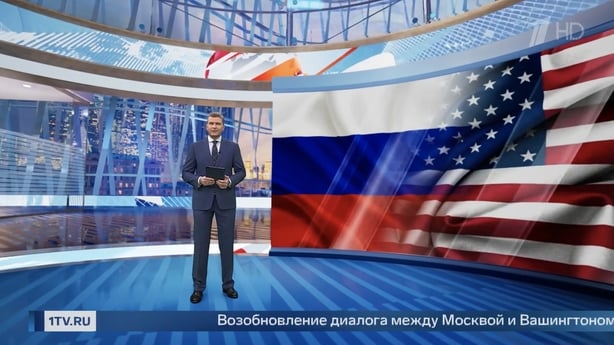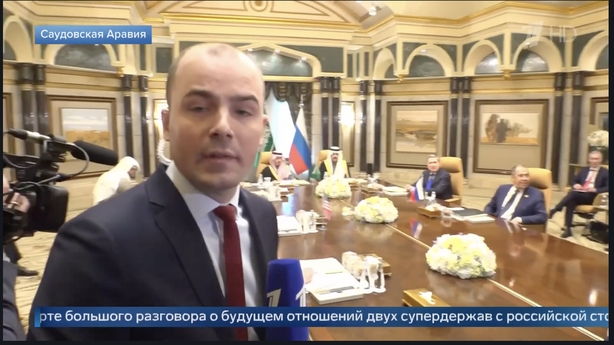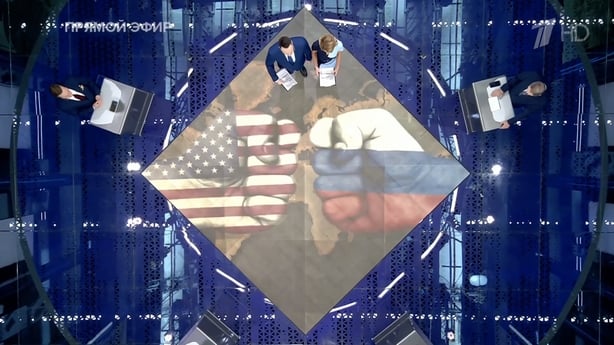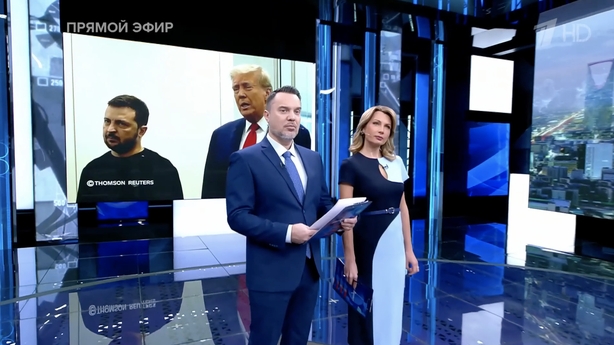Ever since last week's phone call between the US and Russian presidents signalled a dramatic shift in American policy on Ukraine, pro-Kremlin media outlets have barely been able to contain their glee.
"Two superpowers are finally sitting down to defrost their relationship", said the presenter of the six o’clock news on Channel One, the most-watched evening news programme, on Tuesday.
More than once, the meeting in Riyadh between delegations from the two countries was called "historic".
The US delegation and President Trump were praised for their pragmatism and "businesslike mindset".
The complimentary tone is in striking contrast to the one previously used on Russian television to describe the Biden administration.

As the news correspondent reporting from Saudi Arabia marvelled at the grandeur of the palace in Riyadh and the high level of reception for the Russian delegation, the message to audiences back home was unmistakable.
These talks were confirmation of Russia's standing as a global superpower, and not the international pariah it had become after invading its neighbour.

The celebration of Russian "diplomatic successes" remained the top story on yesterday's prime time television in Russia.
Quoting Foreign Minister Sergey Lavrov's speech in the Duma, Russia’s parliament, the evening news called the negotiations between Moscow and Washington "an attempt to clean up Biden’s dark legacy". (Unlike President Trump, his predecessor is rarely called "President" or "Mr" on Russian TV.)
Wednesday’s news programme also covered the Russian President’s reaction to the talks in Saudi Arabia and a possible next step.
"I’d be delighted to see Donald. We haven’t seen each other for a while," said Vladimir Putin, adding that the US President has been "very patient and courteous" with European politicians after how they treated him during the election.
Ridiculing Europe and Ukraine's President
While the US is now being portrayed by Russian propaganda as an equal and almost like-minded partner, they are taking every opportunity to mock Europe for being cast aside by Washington.

On the day of the Riyadh meeting, Channel One said that Europe had been following the US-Russia talks "with resentment", since it was left "overboard".
European leaders were described as "Russophobic politicians" and "arsonists of the war".
The reporter also claimed that Monday's summit in Paris, organised by French President Emmanuel Macron, ended in "scandals and squabbles".
Russian journalists are also dismissing any fears about potential Russian attacks on the Baltic states or other European nations as "illogical" and "panicky".
Yet, observers might remember how Kremlin-controlled television channels similarly mocked warnings about a possible invasion of Ukraine in 2022, just months before it happened.
On the current affairs programme 'Time Will Tell', which also aired on Tuesday evening following the meeting in Saudi Arabia, a commentator scoffed at the prospect of US troop withdrawals from Eastern Europe: "What do the Baltic states mean to the US? Nothing."

While Russian TV channels have long hurled insults at Ukraine's leader, Mr Trump's recent questioning of Volodymyr Zelensky’s legitimacy - and calls for new elections in Ukraine - have emboldened pro-Kremlin media and bloggers, who now freely brand him a "dictator" and an "expired" president.
Sanctions do hurt Russia
Russian TV coverage in recent days has revealed a paradox: Despite relentless anti-Western propaganda, there’s hope that sanctions might be lifted and Western businesses might return.
Yesterday, during a midday talk show on NTV, another popular Russian channel, viewers were asked if they would welcome the return of Western brands to the country.
They offered responses that ranged from "yes, I've missed them" to a more pointed "no, they can't be forgiven until they open branches in [the occupied] Crimea and Donbass".
The exodus of international mega-brands like H&M, Apple, Sony and Coca-Cola from Russia followed Russia’s invasion of Ukraine.
But, for many Russians, the most painful sanctions came with the departure of payment networks Visa and MasterCard, which left them unable to make payments beyond their borders.
However, as one expert on a panel on the business-focused RBC channel noted on Tuesday, Russia will also need to negotiate with Europe if it hopes to regain access to many Western services.
"We were hoping to reconnect to SWIFT, but its headquarters are in Belgium", noted the presenter, unable to hide his disappointment. The Brussels-based electronic payment network is used by financial institutions in more than 200 countries.
The panellists noted the stark contrast between Mr Trump’s business-minded approach to renewing economic ties and what they characterised as Europe’s more "ideological" foreign policy.
For Russian commentators, the widening rift between US and European values has become a source of evident satisfaction.
US Vice President JD Vance’s speech at the Munich Security Conference lambasting the EU drew enthusiastic praise in a country notorious for its harsh laws against what it terms "LGBT-propaganda".
Russian media has long targeted European values of inclusion and tolerance.
One commentator, an MP from the pro-Putin United Russia Party, went so far as to suggest that "Russia and the US could become situational allies against globalists".
Ukraine and its people
Throughout all this, Ukraine's actual fate has barely warranted a mention.
Yet, Russia's true hopes for the war's outcome can be glimpsed in the social media posts of its war correspondents and bloggers - perhaps the most ruthless voices in Russia's media landscape.
"The days of Ukraine are numbered, its first partition is coming", said Telegram channel War Gonzo.
"Here, America is greedily pushing away inclusive Europe, demanding half of Ukraine’s natural resources.
"And what about Russia?
"Russia will only win if this confusion and mess in the enemy’s camp lasts for as long as possible."
Latest stories on Russia-Ukraine conflict







